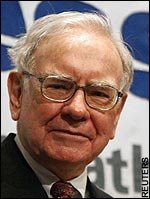The Cheap Revolution

Several years ago I read an article in Motley Fool which quoted Warren Buffet's views of the internet. He and Charlie Munger both said (paraphrasing) the internet will become the ultimate margin killer.
"For society, the Internet is wonderful, but for capitalists, it will be a net negative. It will increase efficiency, but lots of things increase efficiency without increasing profits. It is way more likely to make American businesses less profitable than more profitable." Charlie Munger agreed, saying, "This is perfectly obvious, but very little understood."
The argument is very simple and compelling. By allowing buyers to search quickly and easily for the best prices worldwide, or to create competitive bidding situations via auctions and the like, the Internet will remove pricing inefficiencies and force overall margins down.
By now most everybody uses the net to find the best price for everything under the sun. For example, if you've bought or sold a home in the past few years you've no doubt at least become familiar with the discount/flat fee brokers putting more and more pressure on the 6% commissions paid real estate agents. (By the way, the most emailed article this weekend: The Last Stand for the 6 Percenters?.)
But as Warren Buffett and Charlie Munger understood early on in this revolution, it's not just transactions getting commoditized. The internet as a platform itself, along with the ocean of information available to everyone, is most likely what they were thinking about.

With that in mind, the current issue of Forbes sends a shot across the bow of some of the most widely held companies in America. The New Barbarians is a fascinating look at the extraordinary ways companies like Microsoft, Sun, IBM and Oracle are losing to the likes of Linux and Google, per Bill Coleman, former co-founder of BEA Systems ("the B is for Bill"), and now founder of Cassatt, a company created to exploit the "Cheap Revolution".
"We are going into a period of unbelievable disruption," he says. "We're about to see a huge tectonic shift, more dramatic than anything in the past. This is the next boom, the next big storm. Things are going to get really wild."
They already are. Coleman is one of dozens of new barbarians plotting the Cheap Revolution, the wholesale shift by corporate customers and techmakers to cheap chips and open-source (often free) software such as Linux. They are embracing simplicity, unlocking prodigious new power and cutting tech costs by up to 90%, threatening the Silicon Valley plutocracy: the proprietary gear, "closed" software, redundant backup systems and fat profit margins of incumbents like Microsoft, IBM, Oracle, Cisco, EMC and other blue-chip nameplates.
Speaking of disruption, in case you're like me and can't stand to mess with registration- even if it's free- I discovered you can google "Forbes The New Barbarians", and the first link takes you right in.

2 Comments:
It seems to me that the "Cheap Revolution" forecast pushes too much of the recent past into the future.
I am more inclined to favor the scenario put forth in the book "The Long Tail" with an emphasis on selection or "value" instead of "price."
Forecasting requires "what if" questions, not a static assumption followed by serial logic.
Its sort of like the planned Japanese attack on Pearl Harbor. The US Navy was sailing around the sea of Japan and bothering the Japanese war effort. So the solution was to bomb the fleet at Pearl Harbor and the US Navy would stop. Shouldn't someone in the Japanese High Command have posed the question "what if they don't quit?"
Important points you make re: forecasting.
I was also struck by the notion of unintended consequences in your note- not the way you may have meant, however. I can't get over the irony that some of the companies that have invested the most in the internet might be at the greatest risk.
Regardless, after reading the Forbes piece carefully, and thinking about the ways I use the web in real life, I don't think the price and value components of the issue are mutually exclusive.
Post a Comment
<< Home